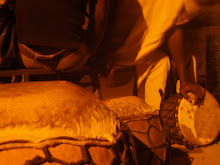I work with some truly remarkable people. I’ve just completed an 8 day stint out doing visitations in my villages, and I am astounded by how extraordinary some of the local workers that I have the privilege to be supervising are.
A week ago, I had just finished my supervisory visit in the village of Koro and was getting ready to bike the approximately 7 kilometers back to Tetou, where I was camping at a friend’s house. One of the local workers that I supervise in Koro, and my main contact there, had some papers to drop off at the health clinic in Tetou and wanted to speak with the doctor there so he suggested that we bike back together. Since I still don’t know the roads incredibly well, I was grateful for his company. Especially in rainy season, which is now, the roads are extremely difficult to navigate in certain sections: nomadic herders have established many spur roads that wind their way back into remote parts of the bush, and this is further complicated by the rains creating large swaths of mud which eradicate signs of the main road and also contribute to slowing the pace of travel even more. There are certain parts where it is simply easier to dismount from the bike, take my shoes off so that they don’t get pulled off by the mud, and slog my way to the other side of the muddy patch where I promptly seek out a Malian to ask for directions since I have inevitably lost my way (or at least suspect that I have). The first time that I biked out to the villages of Borokuy and Kira, it took me 3 hours and one tire repair to go what should have been 9 kilometers. That time and the previous trip to Koro I am fairly certain I took a wrong turn but was then lucky enough to take another wrong turn and still ended up in the correct village.
So, I was grateful that Dabou wanted to bike back to Tetou with me. While I had been in Koro for the day, he had bent over backwards to be a good host. I drank several rounds of Malian tea, was offered innumerable bowls of toh (the local food), given the best parts of the meals that I was actually able to partake in, and practically forced to take some recently ripened corn back with me to cook and eat later. Just like with all our favorite grandmas, in Mali food is love. When it was actually time to leave, I strapped my notebooks on the back of my bike, threw on a camelback and climbed onto my mountain bike. I had Dabou start ahead of me for 2 major reasons: he knew the route better, and I also suspected that he would be slower than me. I was right. This man, who is probably over 6 feet tall, was riding a Flying Pigeon, the endemic bike of Mali which was originally provided to a select few by UNICEF but is now widely available. These bikes come in one size only, which means that children ride them by sticking one of their legs between the crossbars, and men of Dabou’s size are hunched over as they ride. I don’t think that it’s possible for me to be more acclimated to Malian temperatures than a Malian, but the discrepancy between our bikes resulted in his shirt being soaked in sweat by the time we reached Tetou, whereas I was essentially dry. After he dropped off the paperwork, he turned around and headed back to Koro, hopefully completing the approximately 7 kilometer trip just before sunset.
I remember last time I went to Koro, Dabou said to me, ‘This is a simple village, and we are very simple people.’ The way he said it, I felt as though he was apologizing for the state of things there, and I was struck at how much effort my people actually make to improve the lives of their neighbors. Dabou had grown up there, only completed the 6th year of school, and then embarked on the life of his parents and grandparents. Despite these adversities, he has managed to become fluent in French and been working as a relais, or local health worker. His story is not unique within my project, but through my experiences here I am constantly grateful that I was born into the life that I have, and grew up with the opportunities that I too often take for granted.
Subscribe to:
Post Comments (Atom)

No comments:
Post a Comment